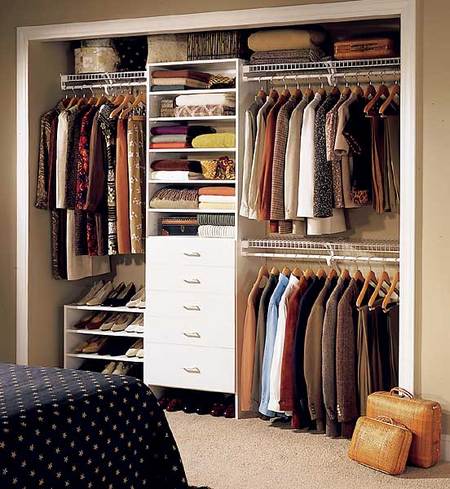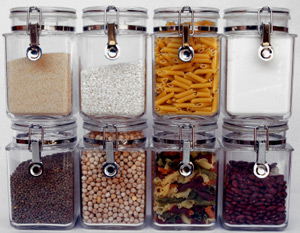Over the years, we’ve talked a lot about how to squeeze more storage space in your house or garage. But really, instead of just planning to build bigger and better cabinets, we all should consider downsizing. Maybe we can reduce our piles of junk and even think about moving to a smaller home.
For many of us — especially baby boomers — downsizing is a growing concern. After all, the house is too big and the kids are gone. Our mortgages are huge, and we want to get rid of them, buy something smaller, and use our equity to pad the bank account or travel the world.
According to the Demand Institute, a nonprofit group that analyzes housing, boomers put off the idea of buying a smaller house during the depth of the down economy, but they are now ready to roll and are thinking small, not big.
But isn’t this a terrible time to downsize? It seems unlikely that we can sell our houses for what we paid for them. Will anything be left once the mortgage is paid off?
Generally, downsizing makes sense financially. Here are some ideas for how to make it succeed:
Obviously, buying a physically smaller home requires an adjustment, and it may take a while to learn to love being cozier. But unless you make a significant change in space, you may not save much on utilities and upkeep, particularly if you insist on having a backyard.
Take the yearly total of your heating and cooling bills and divide your square footage into that number. That will tell you how much you are spending per square foot. Let’s say you’re spending $350 a month on electricity and heat, and your home is 2,800 square feet. Then, you’re spending about 12.5 cents per square foot a month for utilities. If you knock 800 square feet off your living space, you’d save $100 a month.
Try the same square-foot cost formula with your mortgage payment and property taxes and see if downsizing is worth some real cash. You probably can also spend less on insurance.
Of course, you can move to a city or state with a lower cost of living, which can work if you don’t need a job in a hurry. It may be obvious, but don’t pick California, unless you won’t mind paying about $4.25 a gallon for unleaded regular gasoline.
Are you looking for a community with more excitement — like a pool and fitness center? Then you may end up with high homeowners association fees. On the other hand, having a pool and hot tub nearby can make living in a smaller home psychologically more comfortable.

Repair costs can be less as well. Instead of two air-conditioners that might break down inside your mini-mansion, you’ll only have one in your new townhouse, condo or patio home.
You won’t just save money, you’ll save time. There will be less dusting and mopping and fewer bathrooms to clean.
You might even move closer to the action in town so you can walk to restaurants or grocery stores. That can save on gas and car repairs.
You can also take steps to make that new smaller home work better for you, according to designer Christine Cox of Phoenix. Remodel your closet to provide more storage cabinets and shelves. Install more rollout and pullout shelves in your kitchen cabinets.
“We find that people who buy a smaller home want the new residence to have all the high-end features and upgrades — new floors, upgraded light fixtures and crown molding — to make them feel happier about the change,” she said.
But in the end, learning to live with less space may mean living without your comic-book collection and that dining table with eight upholstered chairs. And if you cram all your old furniture into smaller rooms, that smaller space might seem tighter than ever.
Even if you can’t or don’t want to sell, committing to downsizing is worthwhile.
Maybe it’s time to start the cleanout process now so that if and when you sell, the transition will go smoothly.
You don’t need to feel guilty about all your stuff. Apparently, an awful lot of us are collectors. The Self Storage Association, a national non-profit that lobbies for storage company owners, estimates that the United States had about 50,000 self-storage facilities in 2012.
Ask yourself, “Do I have a garage full of stuff, a house full of stuff and even a self-storage unit full of stuff?”
Start by going through your home gradually — maybe a closet or cabinet every week to see what you can get rid of. Ask yourself when you last used each item. If you can’t bear to throw out all your woolen sweaters, then keep a couple as mementoes and give the rest away.
 Take everything out of the closet or cabinet so you can see what was behind the boxes or piles of junk.
Take everything out of the closet or cabinet so you can see what was behind the boxes or piles of junk.
Buy a shredder, a higher-quality one that will last a couple of years, and start slicing and dicing up those 10-year-old piles of paper in the desk or closets. The IRS only stores records on you for eight years.
Once you’re through with the closets, go through the garage and then the storage unit.
Check out the layout of your current home. Do you have too many pieces of furniture in the rooms; do you really need to get rid of some of them?
If you are storing things in boxes, be sure to label the outside with the contents.
Try selling some of your stuff; maybe you can hold a yard sale or an estate sale if you’re really cleaning out. Try Craigslist or eBay. Give it to your kids. Donating furniture or clothing to a non-profit can be a lot faster, and it can also give you a tax deduction that may be worth as much as the take from a garage sale.
Psychologically, all this can be tougher than when your baby went to kindergarten. So some people try to do it gradually. They make lists of things to toss and get rid of things over a few weeks or months.
Some people actually even rent a storage unit and put the excess furniture in it temporarily. We’re not sure we’d recommend that, but after a few months, they claim to feel better about getting rid of what’s in there, provided they haven’t forgotten where they put it.
by DailyComet.com
Hockessin realtor, Hockessin real estate, sell Hockessin homes, buy Hockessin homes

Comments(1)